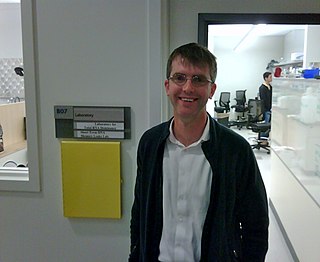A Quote by Michael Behe
As the number of unexplained, irreducibly complex biological systems increases, our confidence that Darwin's criterion of failure has been met skyrockets toward the maximum that science allows.
Quote Topics
Related Quotes
An atheist before Darwin could have said, following Hume: I have no explanation for complex biological design. All I know is that God isn't a good explanation, so we must wait and hope that somebody comes up with a better one. I can't help feeling that such a position, though logically sound, would have left one feeling pretty unsatisfied, and that although atheism might have been logically tenable before Darwin, Darwin made it possible to be an intellectually fulfilled atheist.
One can expect the human race to continue attempting systems just within or just beyond our reach; and software systems are perhaps the most intricate and complex of man's handiworks. The management of this complex craft will demand our best use of new languages and systems, our best adaptation of proven engineering management methods, liberal doses of common sense, and a God-given humility to recognize our fallibility and limitations.
I am convinced more than ever that good communication and leadership are all about connecting. If you can connect with others at every level -one-on-one, in groups, and with an audience-your relationships are stronger, your sense of community improves, your ability to create teamwork increases, your influence increases, and your productivity skyrockets.
...the reason for [this age's] anxiety and unrest is because in one direction, 'truth' increases in scope and quantity - via science and technology - while in the other, certainty and confidence steadily decline. Our age is a master in developing truths while being wholly indifferent to certitude. It lacks confidence in the good.
I thought in my Nobel Lecture I pointed that I was delighted that the Swedish Academy of Science did not quote anything about my current work right now, because the current work that my group is focusing on is actually both the time resolve electrons and possibly x-rays to be able to get the architecture of these molecules, the molecular structures themselves, of very complex biological systems. That's the ultimate goal.


































